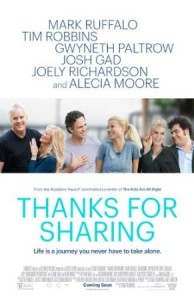Thanks for Sharing
Posted on September 19, 2013 at 6:00 pm
B+| Lowest Recommended Age: | Mature High Schooler |
| MPAA Rating: | Rated R for language and strong sexual content |
| Profanity: | Very strong and explicit language |
| Alcohol/ Drugs: | Drinking and references to substance abuse |
| Violence/ Scariness: | Tense confrontations, some mild peril |
| Diversity Issues: | Diverse characters |
| Date Released to Theaters: | September 20, 2013 |
| Date Released to DVD: | January 7, 2014 |
| Amazon.com ASIN: | B00FXWAZX2 |
Imagine that the one thing you cannot trust yourself to be near is around you all the time, wherever you go. As difficult as it is to recover from addiction to drugs or gambling or alcohol, at least those in recovery can wall themselves off from the places and activities that act as their most dangerous triggers. But sex addicts are surrounded by stimuli all the time. “Is all of Manhattan just one big catwalk?” asks one character in this sympathetic portrayal of people who try to find a way out of what one of them calls his very dark places. “It’s like trying to quit crack while the pipe is attached to your body.”
Sex addicts have to endure the ignorance of those who snicker or ask “Isn’t that just something men say when they get caught cheating?” They have to ride in cabs with titillating videos playing in the back seat. Adam (Mark Ruffalo) avoids temptation by not allowing himself to have a television, home access to internet, or a smartphone. And he has walled himself off from another kind of temptation but not having a romantic relationship.
His sponsor, Mike (Tim Robbins), encourages him to try to date. And when he meets Phoebe (Gwyneth Paltrow), he wants very much to get close to her. She is a breast cancer survivor, which may be one reason he feels that she can understand his struggles. But at first he does not tell her the truth about himself. Mike has a son, Danny (Patrick Fugit of “Almost Famous”), who has a history of substance abuse, and who returns home promising that this time is different.
Adam is a sponsor, too. His “sponsee” is Neil, a doctor whose passion for saving others has been a way for him to avoid being honest with himself about his own behavior, which includes inappropriate touching of women he does not know and elaborate mechanisms for “upskirt” photography. Being court-ordered will not be enough to get him to tell the truth; being fired could be a start. As so often happens in 12-step programs, the key for Neil may be the chance to help someone else, someone he understands and who understands and helps him. An outspoken hairdresser named Dede (rock star Alecia “Pink” Moore) who is in both the sexual addiction and “beverage” (alcohol abuse) programs calls him for emergency help and helping her is the first step in helping himself.
Mike, Tom, and Adam are all at different stages of their recovery, and each faces different challenges and hard truths. Sometimes these are framed in the kind of “But that’s okay” support group-speak that Al Franken used to mock on “Saturday Night Live.” “Why did I pick such a tough sponsor?” Adam asks wryly. “I don’t know, maybe you wanted to recover,” Mike answers with a smile. “United we stand, divided we stagger.” “Thanks for bookending this for me.” And you know someone will have to break down and say, “I’m out of control. I’m scared. And I need help.” But, you know what? That’s okay.
Co-writer/director Stuart Blumberg wisely spares us the easy explanations that allow us to feel smugly separate from those who struggle to achieve a sense of control, and he is frank about the dynamic, positive and negative, between those who struggle with addiction and those who maintain relationships with them. The all-star cast delivers with performances of aching sensitivity and heart. And if a brief moment in the film that has People Magazine’s most beautiful person alive Gwyneth Paltrow in sexy lingerie is the image that is being unironically widely used to promote the movie, well, that helps make its point.
Parents should know that this film concerns sexual addiction and there are frank discussions and portrayals of people who struggle with various kinds of obsessive and destructive sexual behavior. It includes very strong and explicit language, some drinking and references to substance abuse, and some mild peril and violence.
Family discussion: How does sexual addiction differ from other kinds of obsessive and compulsive behavior? Why was it easier for these characters to support and understand each other than to their families and romantic partners?
If you like this, try: “Don Jon” and “28 Days”

